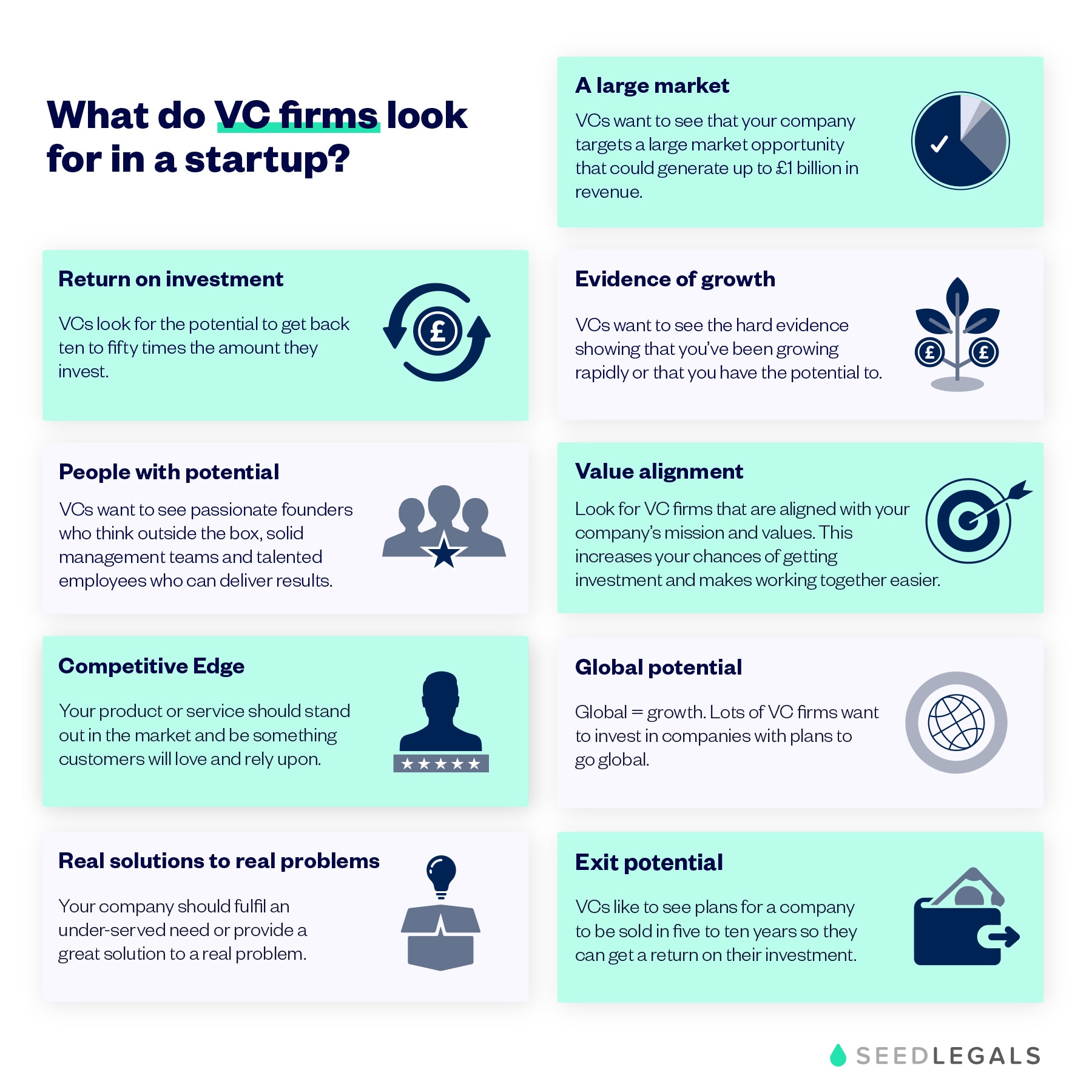45 active early-stage VCs in London 2026
Discover the top early-stage VCs in London. We’ve curated this list to include a wide range of sectors and missions.


Venture capital is a popular source of funding for startups. As a founder, it can give you access to large amounts of capital as well as the expertise of your investors.
In this article, we’ll explain what venture capital is, how it works and what investors look for in founders.
Venture capital is money and resources used for investing in companies that have the potential to give large returns on investment. These companies are often referred to as high-growth companies.
Venture capital is invested in exchange for equity in a company. It’s used to help startups and small businesses grow when you’re still seen as a risky investment.
It can also be helpful to break the term down:
Venture means a risky or daring journey/project
Capital means money and other resources like expertise
A venture capital (VC) firm is a private company that invests money and other resources into high-growth potential companies in exchange for equity. The money they invest comes from one or multiple funds. They invest during all stages of growth from early-stage (pre-seed and seed) to growth stage (Series A, B, C, etc).
VCs are beneficial for founders because they support your company with a variety of resources, including:
Venture capital firms invest in companies with potential for high growth because, although a risky investment, they present the opportunity for a very high return on investment in a short amount of time. VCs expect an ROI of 10 to 50 times the amount they invest within five to seven years. This is what’s so appealing to VC firms about investing in startups, and why VCs support their portfolio companies in a variety of areas. They want to do everything they can to help you succeed so their investment will get a good return.
Venture capital firms need two key things to work:
Venture capital firms get money to invest in companies by raising funds. These funds are financed by a mixture of money from wealthy private investors, financial institutions and investment banks, together known as limited partners (LPs). Each firm has its own private fund(s). Venture capital funds can range anywhere from a few million pounds to a few billion.
A team of experienced investors decide how to invest the money from a VC firm’s fund. Each VC firm has specific guidelines for the types of companies they invest in. For example, some invest in SaaS companies specifically, while others invest in tech companies of any sector. Some only invest in environmental and social-focused companies, and others invest in a particular type of mission – like VC firm Anthemis who only invests in companies that are changing the financial system for the better.
Because the main goal of a VC firm is to get a good return on their investment, it’s in their best interests to provide their portfolio companies with all the resources they need to succeed.
Venture capital firms invest at different stages of the company lifecycle, i.e: Seed, Series A, Series B, Series C, etc. Some VCs focus on only one stage, while others invest in companies of all stages.
| Advantages of working with VCs | Disadvantages of working with VCs |
| They can usually deploy more capital than individual investors | They require extensive due diligence |
| They give you industry and operational expertise | You need a formal reporting structure to keep them up-to-date with what’s happening in your company |
| They connect you with a strong network of industry leaders, investors and other entrepreneurs | You can feel huge pressure to grow rapidly from some of them |
| They increase your visibility and perceived reputation with other investors and potential employees | They’ll often require more of a say over how the company is run and consents over certain matters |
| They can help you with raising your next funding round | They’ll typically expect an exit within 3-7 years of the investment |
Angel investors are private investors who use their own money to invest in companies while VC firms have a team of professional investors that invest money from a VC fund.
VCs usually have stricter conditions and requirements when investing than angel investors and are usually more focused on the company’s exit.
Each VC firm has its own set of guidelines on what they look for in a company. There are, however, some fundamental characteristics that all VC firms will want to see if you’re applying for funding.
Jonny SeamanFundamentally, VC Firms are looking for a great return above all else. They need to be able to see that your startup has the potential to return 10-50x their investment. This means proving you have a product or service people will pay for, a large enough market to sustain a £50M+ exit and that you’re the right team to win the space. Unlike angels, most VCs will expect you to be generating revenue by the time they invest
Funding Expert,
Return on investment
VCs look for the potential to get back ten to fifty times the amount they invest.
People with potential
VCs want to see passionate founders who think outside the box, solid management teams and talented employees who can deliver results.
Competitive Edge
Your product or service should stand out in the market and be something customers will love and rely upon.
Real solutions to real problems
Your company should fulfil an under-served need or provide a great solution to a real problem. The more need there is for your product, the better your potential for growth.
A large market
VCs want to see that your company targets a large market opportunity that could generate up to £1 billion in revenue.
Evidence of growth
VCswant to see the hard evidence showing that you’ve been growing rapidly or that you have the potential to.
Value alignment
Look for VC firms that are aligned with your company’s mission and values. This increases your chances of getting investment and makes working together easier.
Global potential
Global = growth. Lots of VC firms want to invest in companies with plans to go global.
Exit potential
VCs like to see plans for a company to be sold in five to ten years so they can get a return on their investment.

Want to know more about how to get VC funding? Check out our resources:
The amount of money VC firms invest varies a lot and depends on a few key factors:
Most venture capital funds invest at the Series A stage and beyond, when the company is already generating notable revenue (£1M+ per year) and needs capital to scale. The typical cheque size ranges from £1M all the way up to £100M+ at the latest stages.
There are also many early-stage funds in the UK, which back companies at the pre-revenue stage. Usually, these operate as S/EIS funds, similar to angel syndicates, which pool capital from many investors’ together in one investment.
According to RLC Ventures, the average amount of money for early-stage VCs to invest in deals is anywhere between £50,000 and £2,000,000 (or more). They say most companies can expect VCs to commit to around £500,000.
Jonny SeamanWith VC investment cooling slightly against the 2021 highs, it’s a good time to consider other ways of keeping your start-up funded. At SeedLegals, we’ve seen more founders than ever use Agile Investment to keep the lights on and raise investment quickly outside of the more traditional rounds.
Funding Expert,
The UK is a global hotspot for venture capital. There are thousands of venture capital firms here that you could potentially get funding from. Some of the top VCs in the UK are:
Discover more VCs in the UK by reading Top early-stage VC firms in London
and Top venture capitalists in Bristol.
Need help with your funding journey? We’re here to support you. Use SeedLegals to create your pitch, share documents with investors and open and close your funding rounds. Book a call with one of our funding experts and we’ll answer all your questions.






